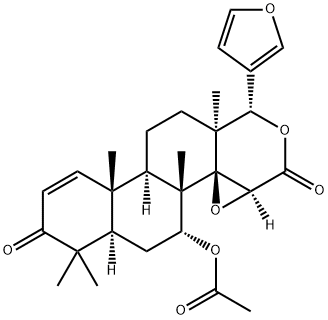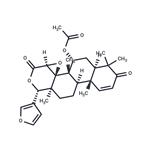Gedunin is a natural inhibitor of the heat shock protein (Hsp90; Item Nos. 22734 | 22735) co-chaperone p23 that also inhibits Hsp90 expression in human teratocarcinomal NTERA-2 cells in vitro at 5 μg/ml. This tetranortriterpenoid, which is isolated from A. indica, binds to and blocks the chaperone activity of p23 to induce apoptosis in HeLa-PRB cells in vitro at a concentration of 20 μM. Gedunin inhibits breast cancer cell proliferation in vitro, with IC50 values of 8.84 and 3.22 μM in MCF-7 and SKBr-3 cells, respectively, and inhibits the growth of PANC-1 pancreatic cancer cells (IC50 = 25 μM) by targeting the sonic hedgehog pathway to induce apoptosis. It also exerts anti-inflammatory effects in vivo. In a mouse model of articular inflammation induced by zymosan , gedunin (0.05-0.5 mg/kg, i.p.) reduces edema formation and the production of inflammatory cytokines. Gedunin (0.5 mg/kg) also inhibits the pleural accumulation of eosinophils and activated T lymphocytes in an ovalbumin-sensitized mouse model of allergic inflammation when administered prior to ovalbumin rechallenge. It also targets the lipopolysaccharide binding site and thus blocks Toll-like receptor 4 (TLR4) signaling in macrophages in vitro at a concentration of 10 μM.
Gedunin is a naturally occurring Hsp90 inhibitor. In vitro, Gedunin induces Hsp90-dependent client protein degradation and displays antiproliferative activity (IC50 values are 3.22, 8.84 and 16.8 μM in SKBr3, MCF-7 and CaCo-2 cancer cell lines respectively). Gedunin exhibits antimalarial activity against P. falciparum (IC50 values are 0.14 and 3.1 μM in parasite development and [3H]-hypoxanthine uptake assays respectively).
ChEBI: A pentacyclic triterpenoid natural product found particularly in Azadirachta indica and Cedrela odorata.
Naturally occurring Hsp90 inhibitor. Induces Hsp90-dependent client protein degradation and displays antiproliferative activity in vitro (IC 50 values are 3.22, 8.84 and 16.8 μ M in SKBr3, MCF-7 and CaCo-2 cancer cell lines respectively). Also exhibits antimalarial activity against P. falciparum (IC 50 values are 0.14 and 3.1 μ M in parasite development and [ 3 H]-hypoxanthine uptake assays respectively).
gedunin induces degradation of hsp90-dependent client protein and displays anti-proliferative activity in skbr3, caco-2 and mcf-7 cancer cell lines with ic50 of 3.22, 16.8 and 8.84 μm respectively1.
1. uddin sj, nahar l, shilpi ja, et al. gedunin, a limonoid from xylocarpus granatum, inhibits the growth of caco-2 colon cancer cell line in vitro. phytotherapy research : ptr. 2007;21(8):757-761.2. lee se, kim mr, kim jh, et al. antimalarial activity of anthothecol derived from khaya anthotheca (meliaceae). phytomedicine : international journal of phytotherapy and phytopharmacology. 2008;15(6-7):533-535.3. conte fp, ferraris fk, costa te, et al. effect of gedunin on acute articular inflammation and hypernociception in mice. molecules. 2015;20(2):2636-2657.

